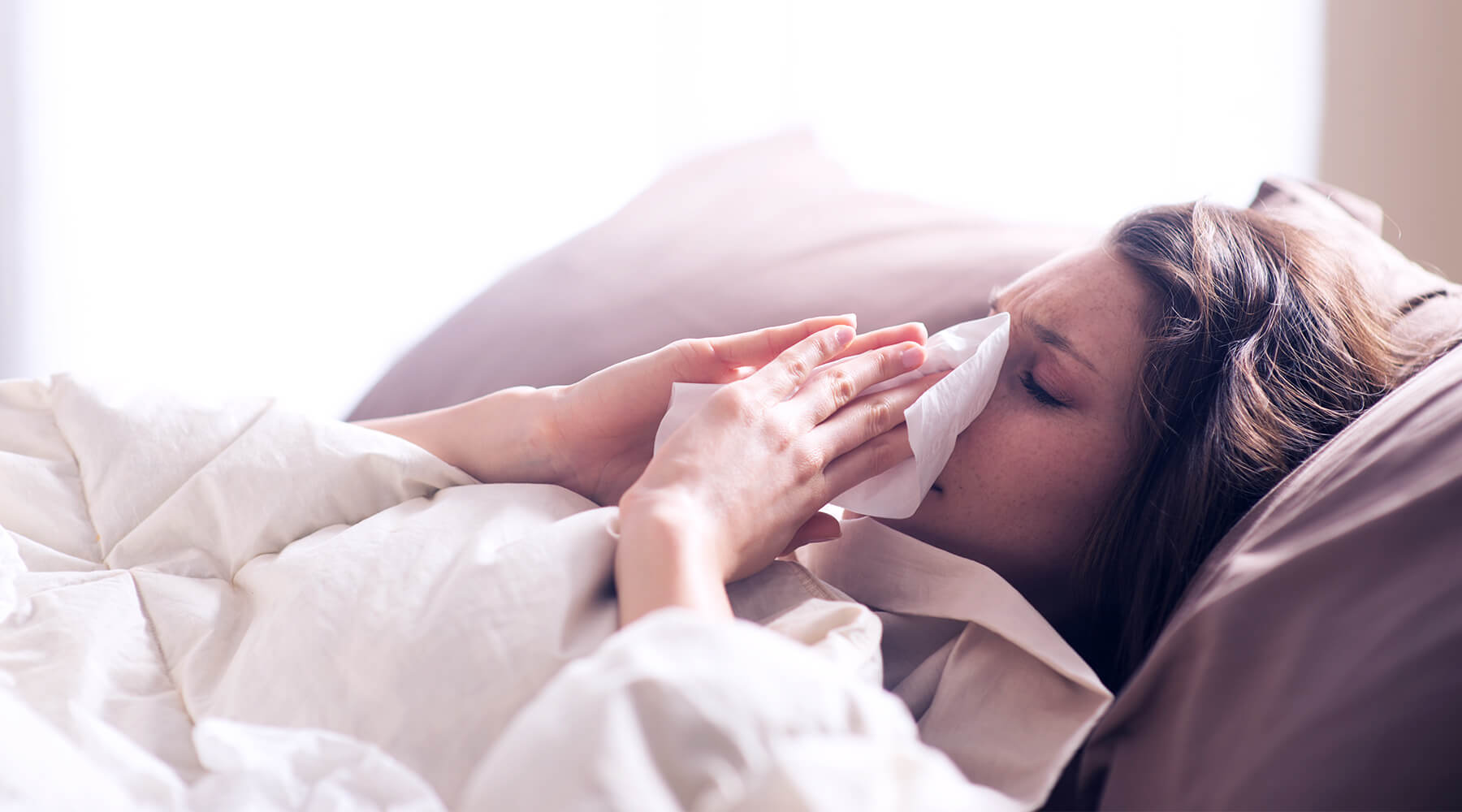
Sleep with a cold
Sleep is the best medicine – but getting a good night's sleep when you have a fever, a runny nose, or a bad cough isn't easy. Learn here how you can get a good night's sleep despite a cold and support your immune system in its fight against pathogens.
Table of contents
- Cold & Sleep
- How cold symptoms disrupt sleep
- Tips for a good night's sleep despite a cold
- Optimal sleeping conditions
- The right sleeping position
- Rest & relaxation
- Preparation & attunement for sleep
- Exercise, fresh air & daylight
- Tips for the immune system while sleeping
- Conclusion
1. Cold & Sleep
Especially in the cold, wet winter months, bacteria, viruses and other pathogens have an easy time and we suffer more from colds or flu infections. So it's time for a strong immune system to ensure that you stay healthy and productive even in the dark winter. To develop a strong immune system, it is important to get enough, quality sleep. Especially during the deep sleep phases that occur more frequently at the beginning of our sleep, the body's natural number of defense cells increases, and the immune system works at full speed to neutralize invading pathogens. lack of sleep On the other hand, it's detrimental to your health. The saying "sleep is the best medicine" isn't without reason!

Of course, we can't always prevent ourselves from catching a cold or the flu. When we suffer from classic cold symptoms like a runny nose, cough, sore throat, or fever, we often can't even think about getting that much-needed sleep. Blocked airways, coughing, or pain make breathing difficult and stress the body and brain. This makes falling asleep a challenge, or we repeatedly wake up during the night – even though sleep is urgently needed to strengthen the immune system and ensure a speedy recovery. So what can we do to sleep well despite the bothersome symptoms of a cold?
2. How cold symptoms disrupt sleep
The most common complaints include breathing and respiratory problems, for example, due to a runny nose, cough, and sore throat, as well as irritation of the mucous membranes or mucus buildup in the respiratory tract. Especially in winter, dry heating air damages the nasal, oral, and throat mucous membranes and inhibits their natural defense mechanisms, making it easier for bacteria and viruses to multiply. It also further dries out already irritated tissue or increases mucus production, which in turn blocks the airways and makes breathing difficult during sleep. This can even make falling asleep difficult. snoring and a peaceful sleep through the night can be prevented by breathing pauses or a dry cough.
But elevated body temperature, headaches, body aches, and psychological stress due to exhaustion or fatigue can also hinder restful sleep during a cold. Fever or chills irritate the nervous system, body aches prevent a relaxed sleeping position, and the proverbial carousel of thoughts disrupts the process of falling asleep.
3. Tips for a good night's sleep despite a cold
#1 Suitable sleeping conditions (room climate)
A cool room temperature between 16 and 18 degrees Celsius and a humidity of 40% – 60% are considered the optimal sleeping environment.Try to ventilate thoroughly before going to bed or increase the humidity by using humidifiers, water bowls, or diffusers. Certain Fragrances or essential aromas, for example chamomile, eucalyptus or lavender, can also have a calming effect on the mucous membranes and lead to a pleasant Sleeping environment contribute to supporting sleep.

#2 The right sleeping position
Especially if you have a bad cold or a tickly cough, you should try elevating your head at night and sleeping on your back. This reduces pressure on your chest and sinuses and allows nasal mucus to drain, preventing pressure-related headaches and making breathing easier while sleeping.
#3 Rest & Relaxation
Our body needs a lot of energy to fight the pathogens within – this leads to stress not only mentally but also physically and prevents restful sleep. Peace and relaxation are therefore more important than ever to calm the constantly active and overstimulated nervous system and enable restful sleep. Therefore, avoid particularly strenuous, demanding activities and strong distractions, and also avoid strong visual stimuli, such as television or computer games, before bedtime.
#4 Getting ready for sleep

Prepare yourself for sleep not only mentally but also physically. A warm shower or bath before bed is not only relaxing but also signals to the body that it's preparing for sleep by lowering your body temperature. The warm, moist steam that rises from the water also has a positive effect on the respiratory tract by stimulating circulation and moistening the sensitive mucous membranes. You should also make sure to drink enough fluids during the day. But be careful: Reduce the amount you drink gradually before bedtime so that you don't wake up in the night with a strong urge to urinate, which will further disrupt your sleep.
#5 Exercise, fresh air & daylight
Lots of peace and lots of sleep However, this doesn't mean strict bed rest. Exercise, sufficient daylight, and fresh air help stimulate circulation and metabolism and supply the respiratory tract with fresh air. It's also important to consume enough daylight to maintain a healthy sleep-wake rhythm, not only making it easier to fall asleep in the evening but also improving overall sleep quality. A walk in the fresh air can also work wonders mentally, making a decisive contribution to getting a good night's sleep and quickly beating a cold.
4. Tips for the immune system while sleeping
Colds, coronavirus, or other nasty infections can quickly cause sleep problems, even though our bodies urgently need rest and recovery at precisely these times. For a good night's sleep, you should, of course, focus on a good Sleep hygiene and ideally also our Sleep tips for a strong immune system For example, our diet plays a key role in healthy sleep and a strong immune system. A balanced diet and certain nutrients, especially vitamins and amino acids, can provide additional support for your body and sleep, especially during an acute cold or flu. You can find out more about this in the following articles in our sleep magazine.
To the article Vitamins for good sleep
To the article Amino acids & sleep
5.Conclusion
-
Cold symptoms such as a runny nose, cough or fever disrupt sleep, reduce sleep quality and prevent the development of a strong immune system.
-
An appropriate room climate (16-18 degrees Celsius, 40%-60% humidity), sufficient relaxation, an adapted sleeping position with the head elevated or a hot shower alleviate sleep-disturbing symptoms and help to achieve a peaceful, restful sleep.
-
Exercise, daylight, fresh air and a vitamin-rich diet facilitate sleep and support the body in the fight against pathogens.
Best wishes and see you soon!



Leave a comment
This site is protected by hCaptcha and the hCaptcha Privacy Policy and Terms of Service apply.